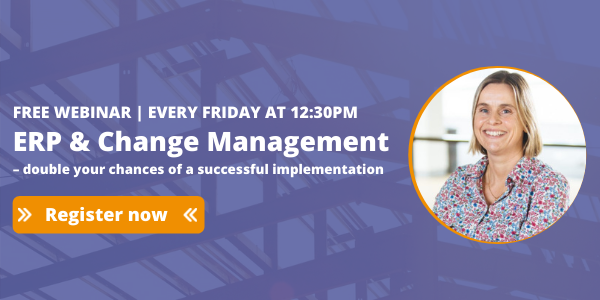According to Aberdeen Group implementing a new ERP could reduce operation costs by 23% and administrative costs by 22% and increase on-time delivered by 24%. But do you have the right business transformation agenda to deliver, measure and exploit these benefits?
Getting an ERP Implementation over the line can be such a long and arduous journey that engagement, attention and motivation can fizzle after Go-Live… meaning the solution is not used to its full capability.
When successfully implemented, your ERP System will be revolutionary and immediately improve:
- Organisation wide efficiency
- Data quality and accessibility
- Informed planning and strategic reporting
- Supply chain management
- True collaboration
Being able to articulate the improvements to data quality, reporting, accessibility and automation will help leverage the return on your ERP System investment. If your organisation lacks the capability or resource to create this strategy, you are not getting the most from your ERP System.
Data Quality, Accessibility & Security
Your ERP Solution ensures a single source of data across the whole organisation with a single repository of data, therefore driving collaboration and accuracy. Within an ERP every touch point of that data, from collection to analysis, will be automated, therefore you instantly have more accurate, informative, and reliable data. Make sure that you have been able to integrate this with other systems to suit your business’ requirements. The upmost advantage of improved data is that your customers will unknowingly benefit from the ERP too. With the centralised storage of client information, you will be able to have focused and targeted engagement with your customers, and by utilising the insights ERP offers you will be able to truly delight your customer.
Planning & Reporting
If the ERP has been correctly implemented across all departments, then you will benefit from a unified reporting system. The reporting opportunities are endless, working hand in hand with your central repository of data and Power BI, you can run a wealth of reports to gain a deeper understanding of your organisation’s performance. From informing resource and capacity planning, facilitating strategic planning, identifying operational strengths and weaknesses you can be sure that an ERP will lead to timely and informed decision making.
Can you confidently say you have full adoption of the system?
An ERP places collaboration at the heart. By streamlining processes, providing everyone access to data at any time, everyone within the organisation is equipped with the fundamentals to do their job from a central location, armed with the right information to make the right decisions. This in hand improves visibility, communication, and employee engagement within your organisation. So why isn’t everyone using it?
Resistance to change is often the main blocker for adoption. Overcoming this will take strong leadership. Take the time to listen and understand the reasons behind the resistance and accept that change can be unsettling for people. Often just feeling heard and valued can break down barriers.
If your communication around the ERP System has lacked engagement from the beginning, then you need a different approach. It is much more than just an ERP system – you will need to change mindsets and behaviours to fundamentally transform ways of working and achieve full adoption
Training & Knowledge Share
Delivering BAU and migrating to a new system can be a challenge as people get fully up to speed whilst still delivering their day-to-day work. Has your training plan been clearly communicated from the start? Or has it been more of an afterthought at Go-Live?
Sometimes the reason the ERP System hasn’t been fully adopted is simply because people are not confident using it. Your approach to training should be long term, so don’t expect to have everyone happily navigating the system over night.
Repetition and practice will help to build confidence, so make sure that every user has adequate time to “play” with the system and familiarise themselves over time. If somebody feels more confident on the system, can they offer up their time to support those less sure in their department?
Use data to determine and address the areas of functionality that people are avoiding. Introduce the training gradually and support your teams to learn over time to ensure you get more return on your ERP investment.
At Nine Feet Tall we understand that an ERP system implementation is so much more than just another IT project. To us an ERP is a strategic initiative to achieve true digital transformation and drive operational efficiencies that will make a meaningful difference. If you have a niggling feeling that your ERP should be delivering more for your organisation, we can happily help you work out what needs to be addressed. Contact: EstherM@NineFeetTall.com


